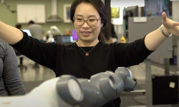 Join speakers and panelists considered to be pioneers of AI, technologists, and creators who are re-imagining what is possible in higher education and research.
Join speakers and panelists considered to be pioneers of AI, technologists, and creators who are re-imagining what is possible in higher education and research.

This year at GTC, you will join speakers and panelists considered to be pioneers of AI, technologists, and creators who are re-imagining what is possible in higher education and research.
By registering for this free event you’ll get access to these top sessions, and more:
- The DLI University Ambassador Program: Preparing Today’s Students and Researchers for Tomorrow’s AI and Accelerated Computing Challenges
NVIDIA’s Deep Learning Institute (DLI) University Ambassador Program facilitates free hands-on training in AI and accelerated computing in academia to solve real-world problems. The program provides educators the opportunity to get certified to teach instructor-led DLI workshops, at no cost, across campuses and academic conferences. DLI workshop topics span from the fundamentals of deep learning, accelerated computing, and accelerated data science to more advanced workshops on NLP, intelligent recommender systems, and health-care imaging analysis. Select courses offer a DLI certificate to demonstrate subject matter competency and support career growth. Join NVIDIA’s higher education leadership and Professor Manuel Ujaldon from the University of Malaga, Spain to learn more about the program and how to apply. Manuel will also discuss how he leverages the program for his students and how these resources have helped him improve the quality of online learning during the COVID-19 pandemic.
Joe Bungo, DLI Program Manager, NVIDIA
Manuel Ujaldón, Professor, Computer Architecture Department, University of Malaga
- Insights From NVIDIA Research
This talk will give some highlights from NVIDIA Research over the past year. Topics will include high-performance optical signaling, deep learning accelerators, applying AI to video coding, and the latest in computer graphics.
Bill Dally, Chief Scientist and SVP Research, NVIDIA
- NASA Frontier Development Lab: Severe Weather Prediction Using Lightning Data
Learn how a state-of-the-art model for time series classification was used for severe weather (tornadoes and severe hail thunderstorms) prediction using lightning data from the Geostationary Lightning Mapper (GLM) device aboard the NOAA GOES-16 satellite. These results are the outcome of NASA Frontier Development Lab (FDL) 2020: Lightning and Extreme Weather, and were accepted to oral presentations in two NeurIPS 2020 workshops and are currently submitted for publication. According to our tests, the GPU implementation of the convolutional time series approach was 27x faster than a CPU implementation. This dramatic gain in speed allowed rapid iteration to build more and better models. Find out how leveraged by NVIDIA V100 GPUs, our results suggest that, with a 15 minute lead time, false alarms for warned thunderstorms could be decreased by 70% and that tornadoes and large hail could be correctly identified approximately 3 out of 4 times using lightning data only.
Ivan Venzor, Data Science Deputy Director, Banregio
- Hands-On Deep Learning Robotics Curriculum in High Schools with Jetson Nano
NVIDIA’s Jetson AI Ambassador will show you how to implement fundamental deep learning and robotics in high schools with Jetson Nano developer kit. If you’re interested in AI education, you’ll learn how to get the most from NVIDIA Jetson Nano developer kit and DLI courses. This AI curriculum includes deep learning fundamental concepts, Python programming skills, an image processing algorithm, and an integrated robotics project (Jetbot). Students can evaluate what they’ve learned and have an instant response on the robot’s behavior.
David Tseng, Manager, CAVEDU Education
- NVIDIA Kaolin and Omniverse for 3D Deep Learning Research
Get an introduction to NVIDIA’s Kaolin library for accelerating 3D deep learning research, as well as a demonstration of APIs for Kaolin’s GPU-optimized operations such as modular differentiable rendering, fast conversions between representations, data loading, 3D checkpoints, and more. In this session, we’ll also demonstrate using the Omniverse Kaolin application to visualize training datasets, generate new ones, and to observe the progress of ongoing training of models.
Jean-Francois Lafleche, Deep Learning Engineer, NVIDIA
Clement Fuji Tsang, Research Scientist, NVIDIA
Visit the GTC website to view more recommended sessions and to register for the free conference.
